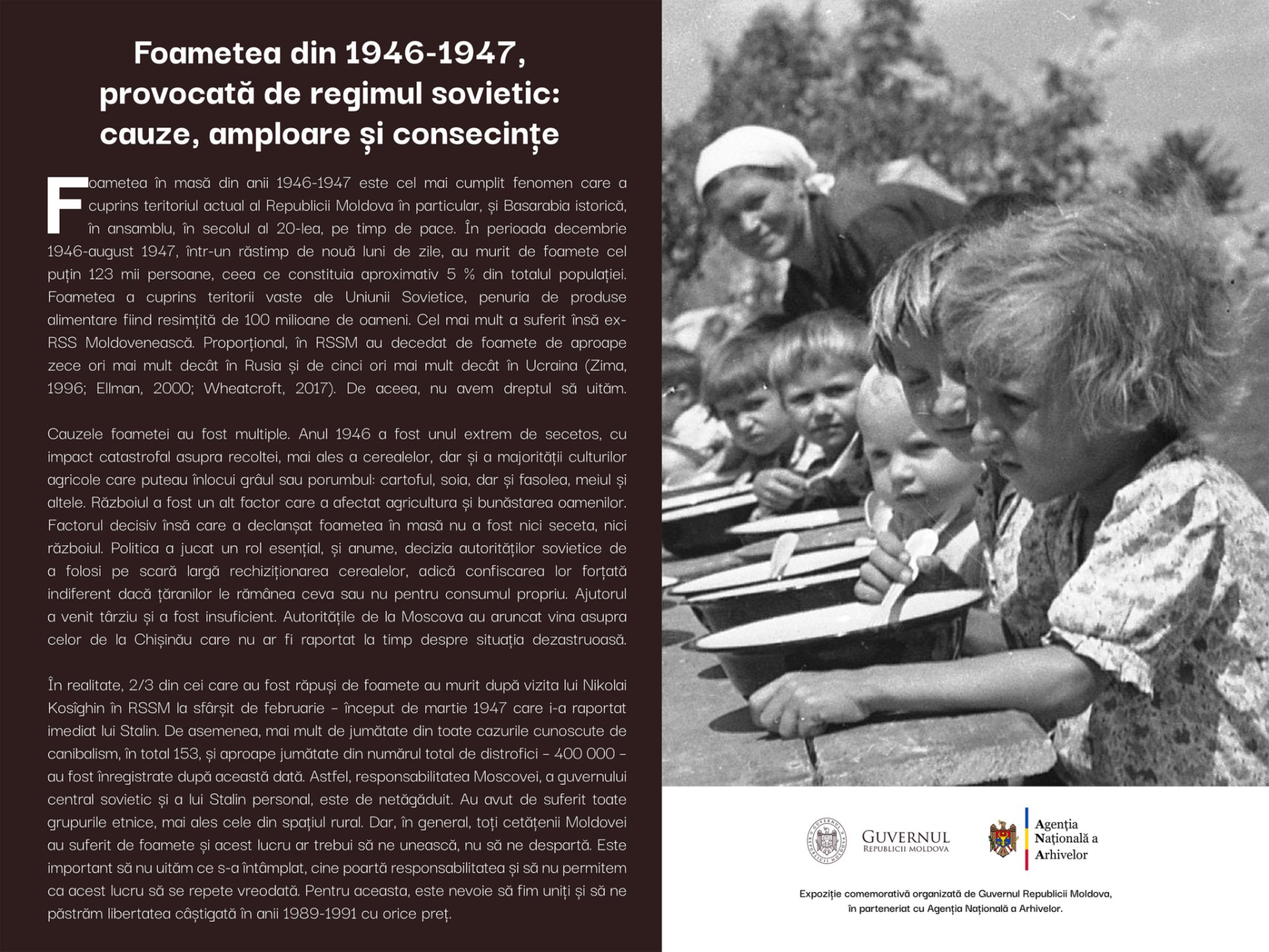
Famine commemoration week to be organized in education institutions of Moldova
The Famine Commemoration Week will be organized In general, vocational, technical, and higher education institutions during April 29-May 6, in order to keep alive the memory of the organized famine of 1946-1947, which historians describe as one of the most tragic pages in the country’s history.
“We commemorate the famine of 1946-1947 - a lesson of truth for the future. We cannot build a strong future without confronting the truth about the past. On these days, we mark one of the most painful pages in the country's history - the organized famine of 1946-1947, which was a tragedy caused by the Soviet regime, with tens of thousands of lives lost and hundreds of thousands marked for life. After the Easter holiday, as of April 29 till May 6, all schools and universities of the country will organize the Famine Commemoration Week,” said the government’s spokesperson, Daniel Voda.
At the same time, a commemorative exhibition about the famine of 1946-1947 is organized outside the government building. The exhibition is also available online on the National Archives Agency's webpage, considered as an educational and reflective resource. It includes 12 topic-related posters, which show the desperate protests of women demanding bread, the drama of starving children, tragic attempts to cross the Prut, “garrets’ sweeping,” and brutal repression. Visitors can discover archival documents, photographs, maps and unique graphs - all based on primary sources.
Also, museums and cultural institutions will organize public lectures, exhibitions, and discussions with historians and writers about the organized famine of 1946-1947. They will take place not only in Chisinau, but also throughout the country.
“The events also reach Edinet, Falesti, Ivancea and in the Gagauz autonomy, so that lessons of the past are known to all generations. We commemorate the famine of 1946-1947, because it is a lesson of truth, a duty of memory. Let's not forget, let's speak, learn and discuss it, because memory does not die, history cannot be erased. We pay tribute to those who died of hunger and to those who survived with dignity. Their story is our story too,” Daniel Voda also said.
On the third Saturday of April, the victims of one of the most tragic pages in Moldova’s history—the organized famine of 1946-1947—are commemorated.
According to the National Archives Agency, this was one of the greatest humanitarian catastrophes to hit the current territory of Moldova in the 20th century. It was not an inevitable natural calamity, but a tragedy exacerbated by the authoritarian and repressive policies of the Soviet regime. According to statistics data, in just a few months, more than 123,000 people died of hunger, accounting for about 5 per cent of the population of the Moldovan Soviet Socialist Republic. Proportionally, Soviet Moldova was the worst hit region in the entire Soviet Union, with a death rate ten times higher than the one of Russia and five times higher than of Ukraine.
AGERPRES and MOLDPRES, partners of event organized in Bucharest
Moldovan-Turkish College to be opened in administrative centre of Gagauzia
Moldovan teachers with at least ten years of teaching subject, who hold teaching degree to no longer be obliged to take retraining courses
Messages supporting press freedom launched by journalists at event held in Moldovan capital
Unique exhibition at Moldovan Parliament
Nine people from Edineț accused of electoral corruption
LIVE // Inauguration of Moldpres – Agerpres documentary photo exhibition Flowers on Prut: 35 years since first Flower Bridge
About 200 explosive objects found in Moldova in April
Police to ensure public order in Moldova on May 9; individuals displaying prohibited symbols risk sanctions
Residents of Moldovan villages without ATMs can withdraw cash from bank cards directly in shops
Moldovan Interior Ministry's structures mobilized to ensure public order on 9 May; citizens warned to avoid symbols inciting to war
Moldovan electoral body accredits national observers for monitoring new local elections
Dozens of schools to be renovated in Moldova with investments worth 54 million dollars
MEP: Moldova is and will remain priority for European Union
Residence information excluded from new identity cards
Moldovan entities can benefit from grants under Interreg Program
Moldovan parliament speaker congratulates sportspeople who won medals at World Weightlifting Championship
Diesel price reaches new historic low in recent years
New member appointed at Court of Accounts
EcoVoucher Program // Thousands of families received six thousand lei each to purchase new appliances and reduce energy bills
Energocom purchased electricity at average price of 109 euro/MWh in April
EU Commissioner's visit to Chisinau
MPs pay tribute to World War II veterans
On 9 May, citizens can attend talks with ministers and various activities organized in PMAN on Europe Day
Mărculești Airport has potential to become regional logistics hub for cargo transportation - Deputy Prime Minister says


